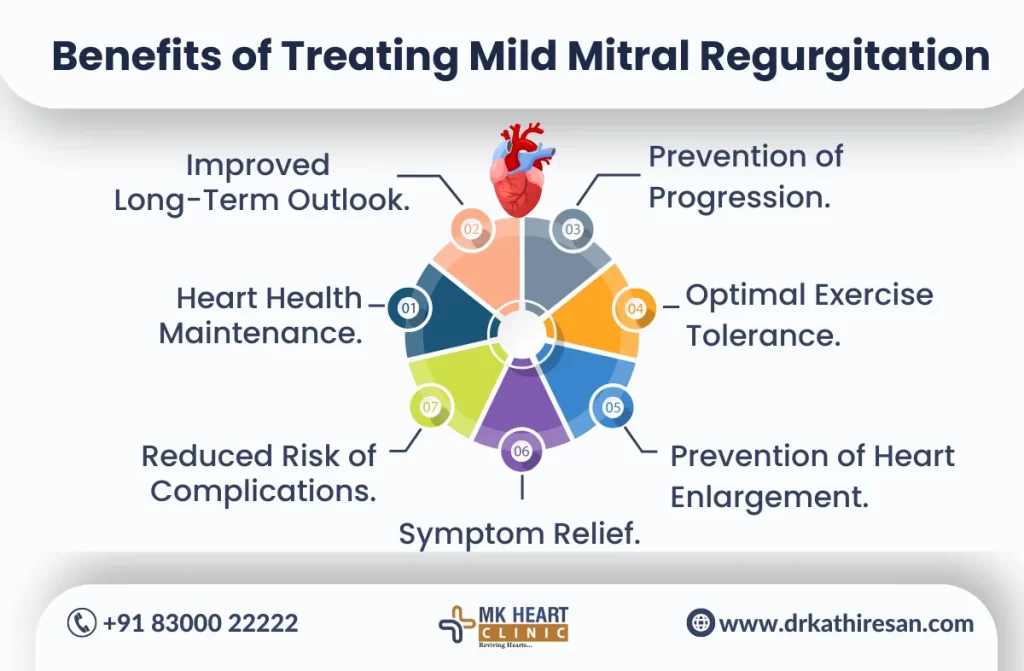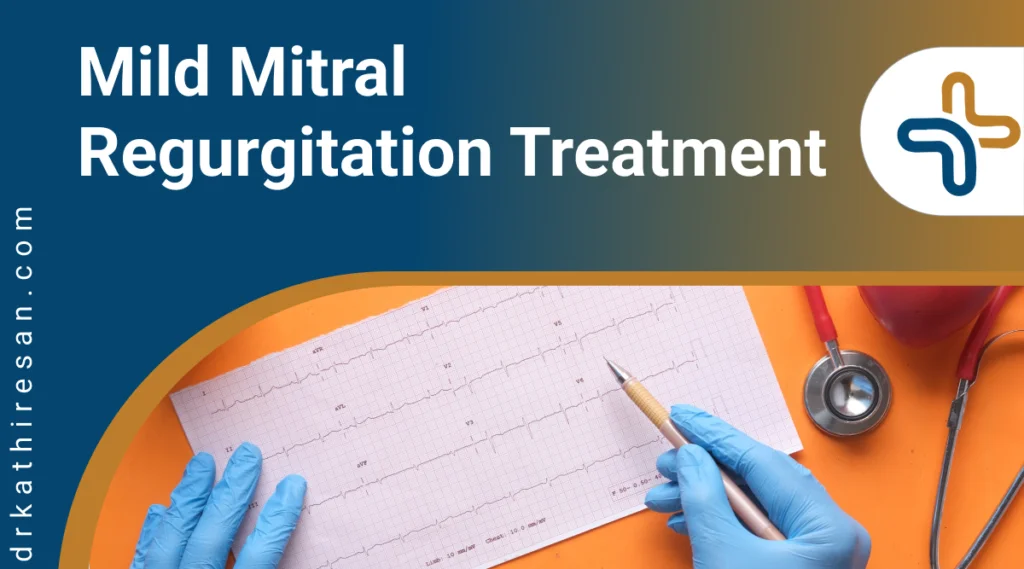Mitral valve disease refers to a group of conditions that affect the mitral valve, one of the heart’s essential valves responsible for maintaining proper blood flow between the left atrium and the left ventricle. This valve can be affected by various disorders, leading to impaired cardiac function and potentially severe complications. For mild mitral regurgitation treatment, regular monitoring and lifestyle measures like heart-healthy diet, exercise, and avoiding smoking are recommended. Medications are generally not necessary at this stage.

Types of Mitral Valve Disease
The types of mitral valve disease that requires mild mitral regurgitation treatment includes:
- Mitral Valve Regurgitation: This occurs when the valve doesn’t close properly, causing blood to leak backward from the left ventricle to the left atrium. It can be caused by structural abnormalities, such as valve prolapse or degeneration.
- Mitral Valve Stenosis: Stenosis entails a constriction of the valve’s aperture, obstructing the smooth blood flow between the left atrium and the left ventricle. Rheumatic fever is a common cause of mitral valve stenosis.
- Mitral Valve Prolapse: In this condition, the valve’s leaflets bulge back into the left atrium during contraction, which can lead to regurgitation. It is often benign but may cause symptoms in some cases.
- Mitral Valve Annular Calcification: Calcium deposits accumulate around the valve’s base, potentially affecting its function.
- Infective Endocarditis: An infection can affect the mitral valve, causing inflammation and damage.
Causes of Mitral Valve Disease
Mitral valve disease can result from a range of causes:
- Mitral Valve Prolapse (MVP): Genetic factors can lead to improper valve closure, causing leaflets to bulge into the atrium.
- Rheumatic Heart Disease: Untreated streptococcal infections can trigger inflammation, scarring, and deformities in the valve.
- Degenerative Changes: Age-related leaflet thickening and reduced flexibility affect proper valve closure, causing regurgitation.
- Infective Endocarditis: Bacterial or fungal infections can damage the valve’s inner lining, impairing its function.
- Congenital Defects: Structural abnormalities present from birth, such as irregular leaflets or cords, can disrupt normal valve function.
- Calcification: Calcium deposits over time lead to stiffening of valve leaflets, causing mitral stenosis and decreased blood flow.
- Hypertrophic Cardiomyopathy: Thickened heart muscle obstructs blood flow through the valve, resulting in dysfunction.
- Systemic Diseases: Conditions like lupus can cause inflammation, leading to mitral valve damage.
Understanding these causes helps in diagnosing and managing mitral valve disease effectively, ensuring tailored treatments for individuals based on the underlying factors.
Symptoms
The symptoms of mitral valve disease can vary based on the type and severity of the condition. Common symptoms that require mild mitral regurgitation treatment include:
- Weakness and fatigue due to reduced blood flow.
- Shortness of breath.
- Heart palpitations or irregular heartbeats.
- Swelling in the ankles, feet, or abdomen due to fluid retention.
- Chest discomfort or pain, especially when the disease leads to complications like heart failure.
Mild Mitral Regurgitation Treatment Options
Mitral valve stenosis treatment depends on the specific type and severity of the condition.
Medications:
- Diuretics: To reduce fluid retention and alleviate swelling.
- Blood Thinners: Prevent blood clots in cases of valve regurgitation to reduce the risk of stroke.
- Beta-Blockers or Calcium Channel Blockers: Help manage symptoms like palpitations and chest pain.
Surgical Interventions:
- Mitral Valve Repair: Whenever possible, repairing the valve is preferred over replacement. This involves techniques to fix the valve’s structure and function.
- Mitral Valve Replacement: In severe cases, mild mitral regurgitation treatment involves a damaged valve to be replaced with a mechanical or biological prosthetic valve.
- Transcatheter Mitral Valve Repair/Replacement: Minimally invasive procedures that can repair or replace the valve without open-heart surgery.
- Annuloplasty: Repair of the valve’s base to reshape and support its structure.
Lifestyle Modifications:
- Diet: Adopting a heart-healthy diet low in sodium and saturated fats can help manage symptoms and prevent complications after mitral valve stenosis treatment.
- Exercise: Regular physical activity can improve heart function and overall well-being, but it should be done under medical supervision.
- Smoking Cessation: Quitting smoking reduces the risk of further damage to the heart and blood vessels.
Regular Monitoring:
Patients with mitral valve disease need regular check-ups to monitor the condition’s progression and adjust mild mitral regurgitation treatment as needed.
Conclusion
To conclude, mitral valve disease presents a spectrum of challenges that impact cardiac function and overall well-being. Understanding the distinct types, recognizing symptoms, and pursuing appropriate regimens for mild mitral regurgitation treatment are paramount. Advances in medical interventions and ongoing research continue to enhance the management of mitral valve disease, underscoring the importance of early detection, comprehensive care, and collaboration between patients and healthcare professionals.
Also, Read Transcatheter Mitral Valve Replacement.



